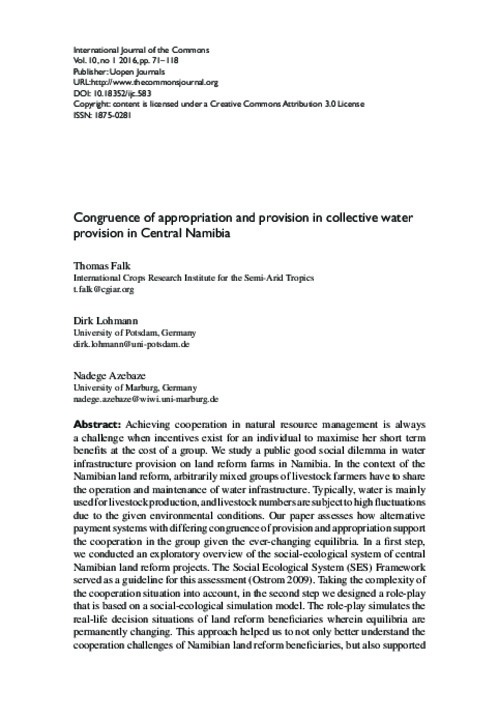GPS based tools for extensively reared cattle: relationship between temperature and animal activity
A study was conducted to track a group of grazing cows by GPS-GPRS technology. GPS devices were placed in the neck of 3 non-gestating and non-lactating Morucha cows (averaged 8 years old). The GPS units emitted data regarding animal position every 10 minutes for a period of 28 days in which the animals could range freely in the experimental farm. Data were processed using the appropriate software to generate parameters related to animals’ activity, such as velocity of movement or estimated grazing area.
Changes in regulating ecosystem services following establishing exclosures on communal grazing lands in Ethiopia: a synthesis [Abstract only]
Participatory research approach in mountain pasture management in Central Italy
Most mountain pastures in Italy are underutilized or even abandoned due to urbanization, low in - comes, limited social opportunities for rural families. A three years research was done on the rehabilitation of some pastures in two farms of North-Western Tuscany, central Italy.
Grazing land management and sheep farm viability in semi - arid areas : evidence from Western Lesvos , Greece
In semi-arid areas of the Mediterranean basin, sheep and goat herding has been a land management activity for millennia. In the last decades, intensification of grazing has resulted in grazing land degradation. Today, many sheep farms face growing dependence from feed to cover the dietary needs of animals, as grazing land productivity covers only a fraction of these needs and decreasing economic outputs. In this paper, we present a conceptual framework for linking grazing lands management practices and economic viability of sheep farms in Agra, a village in Western Lesvos.
Mountain pastures and local products in Southern Albania. Between production and resource management issues
The paper aims to present changes and current dynamics of mountainous pastoral systems in Southern Albania (Korca region) and to identify origin-based quality products as a strategy for sustainable rural development. According to the historical data (available or reconstructed through interviews), rapid and unregulated changes in mountainous productive systems within the post-communism transition threaten local natural resources and cultural landscapes.
The role of governance in sustainable rangeland management
The management and rehabilitation of degraded rangelands are inherently complex in south Mediterranean where state and tribal owned pastures are grazed commonly by the agro-pastoralists. The prospect for increased degradation primarily caused by overgrazing and recurrent droughts is currently at alarming levels. Reversing the negative trends primarily requires insightful management practices, institutional and policy support, and ultimately sound governance.
Sheep and goat farming and grasslands conservation : in need of proper policies
Mediterranean landscapes have been formed through human activity for millennia, which resulted in a particularly rich and rare biodiversity. Among these activities grazing is the most beneficial on biodiversity. However, the sheep and goat sector is rapidly transforming into sedentary-housed types and pastoral land is abandoned. The Greek example is presented and a range of policies are suggested to halt this trend and conserve pastoral land biodiversity in Mediterranean
An assessment of integrated watershed management in Ethiopia
Sustainable participatory watershed management is an approach promoted by the Ethiopian government to restore natural resources and agricultural productivity across the country. This comparative study between six watershed programs shows that this approach increases farmers’ food security and incomes (around 50% on average), as well as their resilience to drought and other climate shocks. However, the study also confirms that the nature and scale of impact can vary significantly between watershed programs.
Congruence of appropriation and provision in collective water provision in Central Namibia
Achieving cooperation in natural resource management is always
a challenge when incentives exist for an individual to maximise her short term
benefits at the cost of a group. We study a public good social dilemma in water
infrastructure provision on land reform farms in Namibia. In the context of the
Namibian land reform, arbitrarily mixed groups of livestock farmers have to share
the operation and maintenance of water infrastructure. Typically, water is mainly
used for livestock production, and livestock numbers are subject to high fluctuations
End of Desertification? Disputing Environmental Change in the Drylands
It took scientists more than three decades to transform a perceived desertification crisis in the Sahel into a non-event. Looking beyond the Sahel, the chapters in this book provide case studies from around the world that examine the use and relevance of the desertification concept.
Rangelands: Pastoralists Do Plan! Community-Led Land Use Planning in the Pastoral Areas of Ethiopia
The Government of Ethiopia and more specifically, the Rural Land Administration and Use Directorate, (RLAUD) has identified land use planning as an important tool for the sustainable development of the country. Land use planning is vital for optimising the use of the land and for reconciling conflicts between different land uses. Land use planning should be carried out at different levels – from national to regional to local including community: these different levels should support and integrate with each other.




